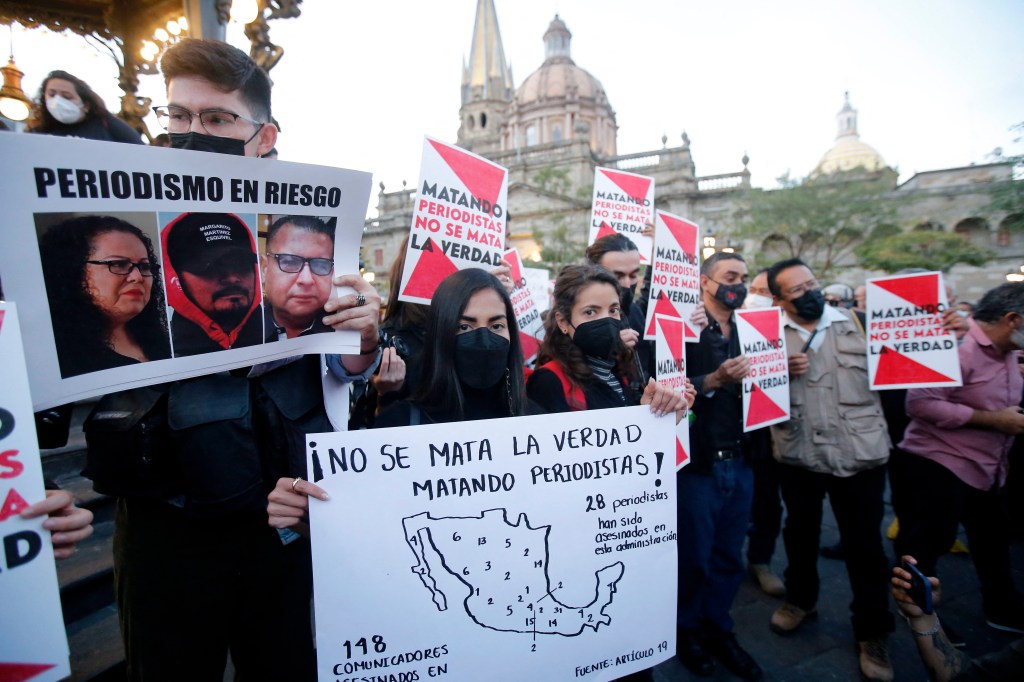In Mexico, the killing of camera operator and video editor Roberto Toledo in Zitácuaro, a town 80 miles west of Mexico City, marks the fourth media worker killed in the country in less than a month in 2022. CPJ Latin America and the Caribbean Program Coordinator Natalie Southwick discussed the climate for journalists in Mexico in the latest episode of “The Take” podcast from Al-Jazeera.
Read CPJ Mexico Representative Jan-Albert Hootsen’s feature on the recent killings here.
Meanwhile, in the 12 months since the Myanmar military coup on February 1, 2021, the junta has escalated repression of journalists by intimidating, censoring, arresting, detaining, and outright killing journalists who report on their crimes and abuses. The junta generals seeking to further silence critical voices with new proposed cybersecurity legislation that aims to make virtual private networks illegal, among other provisions.
In a new opinion piece for CPJ, Senior Southeast Asia Representative Shawn Crispin examines the dire state of press freedom in the country and local journalists’ brave efforts to fight back.
- Russian authorities close Deutsche Welle office after Germany revokes RT’s license. Separately in Russia, new immigration laws require regular medical tests, fingerprinting
- Iowa, Kansas lawmakers bar media from Senate floors, stymieing newsgathering
- Taliban forces detain two journalists in undisclosed location. Separately, the Taliban block an Afghanistan Journalists Federation press conference
- Attackers shoot at, firebomb offices of Haitian outlet Radio Télé Zenith
- Kyrgyzstan authorities investigate Kaktus.media for alleged ‘war propaganda’
- Armed men attack Ghana broadcaster Radio Ada FM over coverage of mining deal
- Yemen Houthi forces raid, shutter radio broadcasters
- In India, a fake online auction offers prominent Muslim women for sale, including several journalists. Separately, Indian journalist Rana Ayyub receives rape, death threats, and the Indian government suspends MediaOne TV for unspecified “security reasons”
- Three Philippine media outlets face a string of cyberattacks
- Syrian journalist Amer Matar spoke to CPJ about facing his torturer in court
- CPJ calls on authorities in Botswana to reject bill on warrantless surveillance
- CPJ joins call for Turkey to release journalist Sedef Kabaş
- CPJ and rights groups call for release of Nusrat Shahrin Raka, sister of Bangladeshi journalist Kanak Sarwar. Separately, Bangladeshi journalist Mamunur Rashid Nomani harassed following 2020 assault, detention
- CPJ joins letter calling for release of journalists, others arbitrarily detained in Cameroon
- Palestinian Authority sentences journalist Abdulrahman Thahir to 3 months in prison
With the Olympics starting Friday, journalists from around the world have traveled to China to cover the Games; however, they may find themselves facing a more difficult reporting climate than expected, as they encounter challenges from coronavirus restrictions to digital surveillance. And as a recent report from the Foreign Correspondents’ Club of China found, 99% of foreign correspondents surveyed said China’s reporting conditions did not meet what they considered “international standards.”
CPJ previously expressed concern about the ability of the press to work freely during the event, given the country’s deplorable record on press freedom for local and foreign journalists, and behavior during the 2008 Summer Olympic Games in Beijing. Journalists reporting from the Games should be sure to bookmark CPJ’s safety advisory on covering the Olympics, which includes helpful information on digital and physical safety.
What we are reading and listening to
- A year after Myanmar coup, growing surveillance threatens lives — Rina Chandran, Thomson Reuters Foundation
- The battle for the world’s most powerful cyberweapon — Ronen Bergman and Mark Mazzetti, The New York Times Magazine
- In an election year, press freedom declines in Angola — Giovana Fleck, Global Voices
- Who’s killing Mexican journalists? — Al-Jazeera’s The Take podcast
- Stories of kidnapped journalists must be told despite blackouts — James Harkin, Columbia Journalism Review
- ‘Absolutely useless’: Advocates scrutinize protection programs following killings of two journalists — Sandra Dibble, Voice of San Diego
- Sexual harassment in the media: 2020-2021 research — World Association of News Publishers
